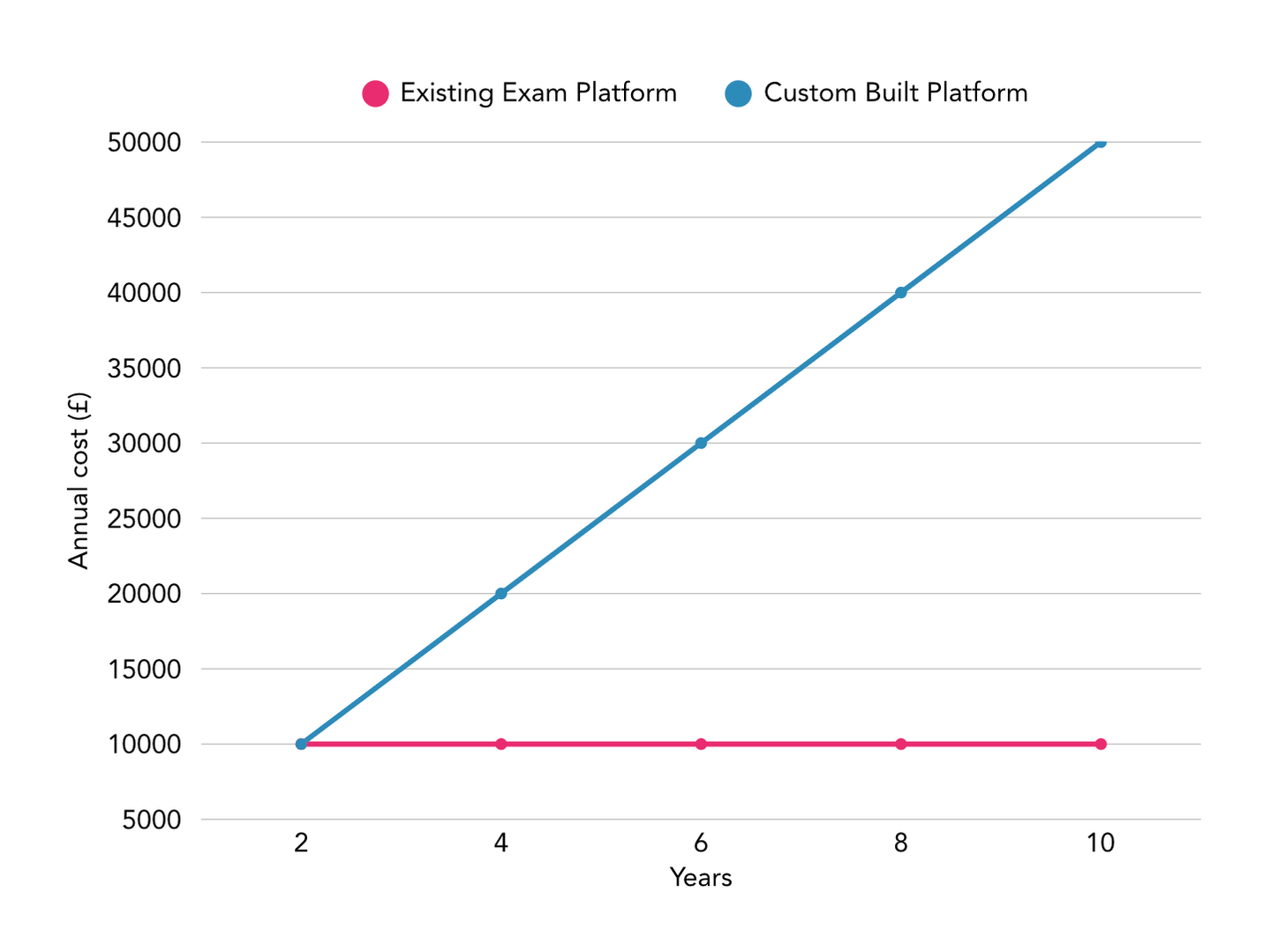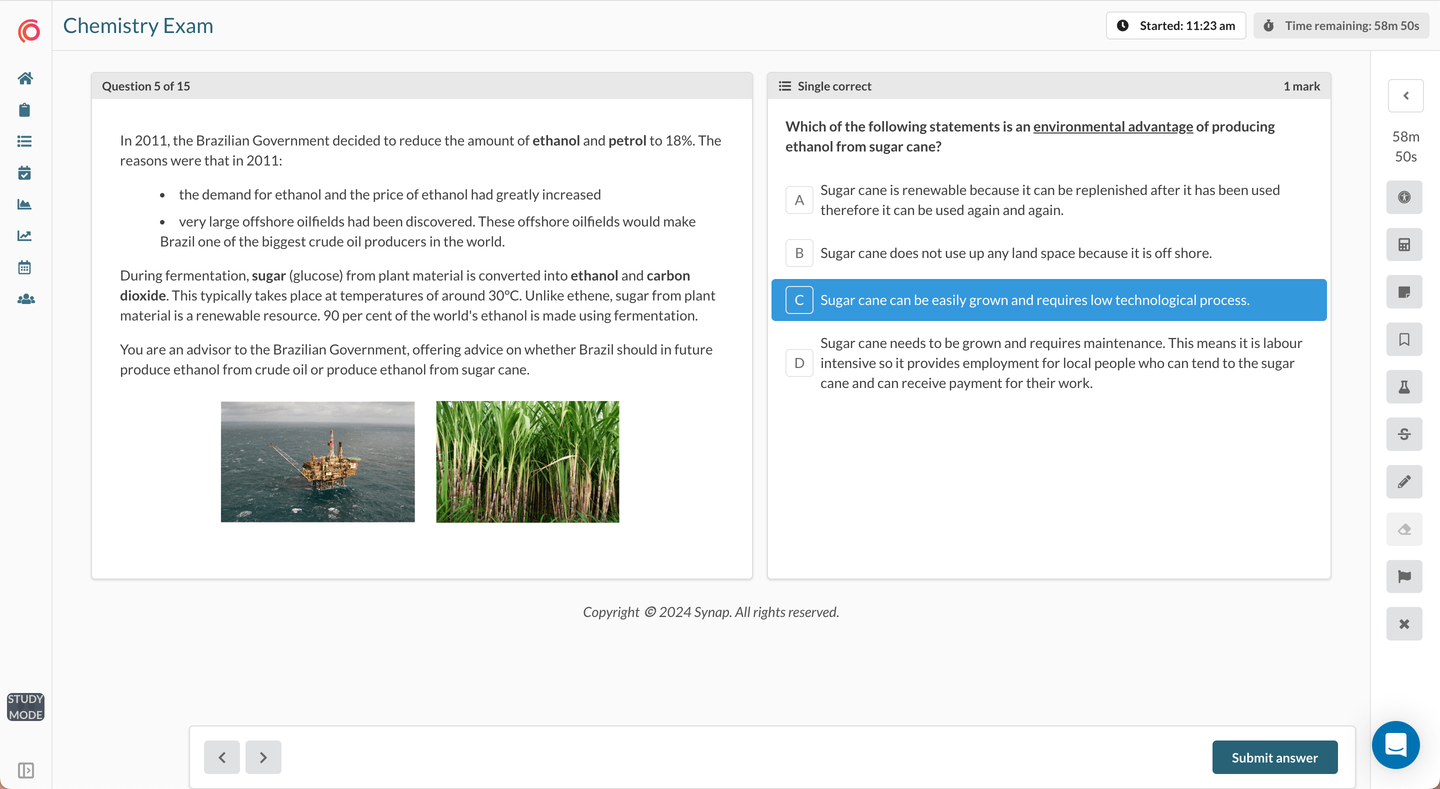Delivering online exams often raises a key question for organisations: build an exam platform from scratch or use an existing exam solution? While a custom built system may sound appealing, it’s ultimately high-risk, time-consuming, and costly. Established online exam platforms already offer the expertise, scalability, and support you need. In this post, we explore the pitfalls of developing your own exam system and why opting for a trusted, ready-made online exam platform is the smarter choice.
The true costs and pitfalls of building your own online exam platform
1. High and rising costs
Developing a robust, secure exam platform isn’t just about coding, it requires developers, designers, testers, and ongoing IT support. Costs escalate fast: beyond the initial build, you have updates, bug fixes, feature enhancements, and hosting, all of which are essential to keep the platform reliable and secure.
Imagine an exam day where your custom-built system crashes because the servers couldn’t handle the load, that’s the hidden cost of building from scratch.

2. Time-consuming builds that delay launch
Even with an experienced team, building from scratch can take significantly longer than expected. A project estimated at a few months can easily stretch beyond a year, delaying your ability to deliver assessments.
3. Never-ending maintenance burden
Building and launching the platform is only the beginning. You will need to stay on top of:
- New feature development to meet user expectations.
- Security patches to protect against ever-evolving threats.
- Server maintenance and hosting. These tasks demand constant attention and resources. Instead of moving on to higher-value initiatives such as improving the assessment content or scaling your offering, you’re stuck in a cycle of upkeep. The moment you think it’s “done,” you’re already back in maintenance mode.
4. Serious security vulnerabilities
Protecting data is paramount for high-stakes exams. Developing secure systems is complex, and even experienced teams can struggle to anticipate and mitigate risks such as data breaches, phishing, or denial-of-service attacks.
5. Reliability challenges and missed SLAs
Maintaining service-level agreements (SLAs) and ensuring uptime under heavy traffic is difficult with a bespoke solution. Scaling reliability demands heavy investment in infrastructure, a dedicated DevOps or site reliability engineering teams, and disaster recovery planning. Without this, outages and performance issues are almost inevitable, damaging your reputation.
6. Poor user experience and accessibility gaps
A seamless exam experience matters for both candidates and administrators. Designing intuitive workflows, accessibility features, and smooth navigation isn’t quick or straightforward. Many in-house teams underestimate how long it takes, the complex design decisions, and that is requires specialist knowledge they might not have.
7. Long term resource drain
Beyond the initial build, you’ll face recurring costs for updates, testing, compliance checks, and customer support. What looks like a one-off project can quickly turn into a never-ending resource drain.
Why you should choose an established exam platform

Launch in weeks, not years
With an established online exam platform, you avoid spending months or years building from scratch. Ready-to-use tools for authoring, scheduling, and proctoring let you start delivering assessments almost immediately. You also save significant development costs, freeing budget to improve exam content or expand programmes, investments that directly enhance the learner experience and support scale.
Protect candidate data effectively
Trusted by schools, universities, and organisations worldwide, commercial exam platforms have been stress-tested in real-world, high-stakes environments.
“I was blown away by their professionalism, their ability to accommodate any and all (and even strange) request, and their willingness to assist and to provide an amazing professional service in very stressful conditions.” - Henda S, Program Director at UFS Whether you’re running a small pilot or hosting thousands of simultaneous exams, these platforms can scale to meet demand without compromising performance, saving you the cost of building and maintaining complex infrastructure in-house.
Enterprise grade security
Established platforms follow the latest security protocols, from encryption, GDPR compliance and ISO certifications, ensuring sensitive candidate data stays safe. Regular monitoring and updates reduce the risk of breaches, giving you peace of mind that your exams meet the highest security standards without having to fund an in-house cybersecurity team or constant penetration testing.
Stay up-to-date without extra effort
Vendors roll out new features, enhancements, and fixes on a regular basis. You don’t need to worry about keeping up with the latest trends or patching vulnerabilities, the platform does it for you. Instead, you can put resources into professional development for staff, better assessment design, or wider learning technology initiatives.
Leverage expert guidance
Choosing a trusted platform means access to a team of industry experts. From onboarding and training to best practices in online assessments, their knowledge helps you deliver exams smoothly and with confidence, letting your own team focus on teaching improvements and student outcomes rather than troubleshooting technical issues.
Deliver a seamless branded experience
Many platforms let you apply your organisation’s branding, domain and email sender so the platform looks and feels like your own. This provides all the benefits of a custom-built system, such as a seamless candidate experience, without the financial and operational risks of building it yourself.
Focus on what matters most
Ultimately, an exam platform should support your mission, not distract from it. By choosing an established solution, you can redirect time and resources away from technical upkeep and towards what really matters: developing curriculum, supporting users, freeing up your teams time and delivering high-quality education and training.
Cost & value comparison: Custom-built vs ready-to-use exam platforms
Decision Factor
Custom-Built Platform
Ready-Made Platform (SaaS / Off-the-Shelf)
Upfront Cost
$150k–$1m (£121,500–£810,000) for design, development, and testing [1]
$10k–$500k (£8,100–£405,000) depending on licence and scale [1]
Deployment Speed
Months to over a year before launch, often with delays [4]
Days to weeks – ready to launch quickly [4]
Total Cost of Ownership (5 years)
$750k+ (£607,500+) due to ongoing maintenance, updates, and staffing [3]
$50k–$300k (£40,500–£243,000) predictable licensing and vendor support [3]
Maintenance Burden
High – requires in-house team for bug fixes, updates, and compliance [2]
Low – handled by vendor, reducing IT spend by up to 15% [3]
Long-Term Savings
Unpredictable – scope creep and rising dev costs common [2]
Up to 70% savings over 5 years with SaaS vs custom [4]
Experience the benefits of using an established exam platform
Save yourself from the high costs, complexity, and risks of building an exam platform from scratch. Instead, take advantage Synap’s online exam platform , a tried-and-tested solution that’s ready to go today. Start your journey by booking a demo and then a 14-day free trial and see how easy it is to deliver secure, reliable, and scalable online exams.
References
- Moldstud, 2023. Custom vs Off-the-Shelf ERP Systems: Choosing the Best Solution for Your Business. online Available at: https://moldstud.com/articles/p-custom-vs-off-the-shelf-erp-systems-choosing-the-best-solution-for-your-business Accessed 20 Aug. 2025.
- FullScale, 2023. Custom Software vs Off-the-Shelf Cost Analysis. online Available at: https://fullscale.io/blog/custom-software-vs-off-the-shelf-cost-analysis/ Accessed 20 Aug. 2025.
- Starterstack, 2023. Custom vs Off-the-Shelf: Long-Term ROI Comparison. online Available at: https://starterstack.ai/blog/custom-vs-off-the-shelf-long-term-roi-comparison Accessed 20 Aug. 2025.
- Tres Astronautas, 2023. Custom Software vs SaaS: Which Fits Your Business Needs? online Available at: https://www.tresastronautas.com/en/blog/custom-software-vs-saas-which-fits-your-business-needs-software-evaluation-template Accessed 20 Aug. 2025
